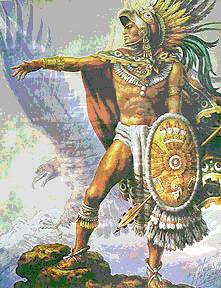|
|
Legend
16th century
Blood, red and
scalding as fire coated his fists, white-knuckled and
clenched tightly around the shaft of the young warrior's
spear. The still, silent forms of his enemies
circled closely at his feet, as if in deadly reverence
of his power, and nothing moved - nothing except for the
rise and fall of his chest with every labored breath. in deadly reverence
of his power, and nothing moved - nothing except for the
rise and fall of his chest with every labored breath.
Ferocity among Aztec
warriors was certainly not an uncommon trait, yet in the
body of this young man - he who could hardly be believed
to be a man - was a startling intensity and ruthlessness
that could not be rivaled, and which few dared
challenge. Thousands of courageous and foolish
souls were sent to the afterlife, to Tlalocan1,
by his hands, forging a familiarity with Tlaloc that
tempted others to fear that this warrior was his worldly
counterpart, or even his earthly incarnation.
Yet this young warrior
was not affiliated with the gods. He was not
reaping souls for any purpose other than the
satisfaction of his insatiable blood-thirst. And
it was this wanton savagery, this selfish slaughter that
angered the gods. Mictlantecuhtli2, god
of the underworld known as Mictlan, resented the vast
diversion of souls from his realm, and shook with
tremendous anger following every battle. So
violent became his rage against the warrior, the
insolent boy who felt he had the power to take lives and
so great became his frustration that he devised a plan
to still his spears and arrows for eternity. As he
thought, his shaking ceased, yet his anger continued to
build, growing in intensity until his plan could be
fulfilled.
And then came the day.
Mictlantecuhtli received
word that a battle was to be staged imminently, in which
the young warrior would, of course, take part. Thus,
as the ranks began their steady trek to the battlefield,
another force gathered under their bare, calloused feet.
And it was most
fortuitous that, in his eagerness, the young, savage,
warrior arrived far in advance of the others. As
he stood alone, solemnly collecting his strength at the
base of the mountains, the
deadly fury of Mictlan erupted in a paradox of
underworld vengeance from the sky,
shattering the silence and the earth, sending forth the
infernal contents of the underworld, fed by the scathing
wrath of Huehueteotl3,
who loathed the warrior for extinguishing the flames he
had placed in each of the murdered men to give them
life.
When the warriors
arrived, fatigued from their journey, reluctant to
fight, they lost the remainder of their breath to the
sight that loomed before them. The mountains that
had stood in peaceful, imposing repose were now shrouded
in ash that whispered as it fell, telling a story of
violence. A story that spoke of the lives destroyed at
the hand of the young, blood-thirsty warrior, who
disappeared in a flash of the gods' violent wrath. They
did not fight that day.
The two prominent
volcanoes, Nevado de Colima and Volcan de Fuego, or
Volcan de Colima, belong, respectively, to
Mictlantecuhtli and Huehueteotl. Mictlantecuhtli
remains relatively silent, having had his vengeance, yet
Huehueteotl still shudders and erupts as he stokes his
hearth and occasionally reminds all that, although he
may give the fire of life, he may also take it away if
we do not respect the spark within others, like the
young, ill-fated Aztec warrior.
|